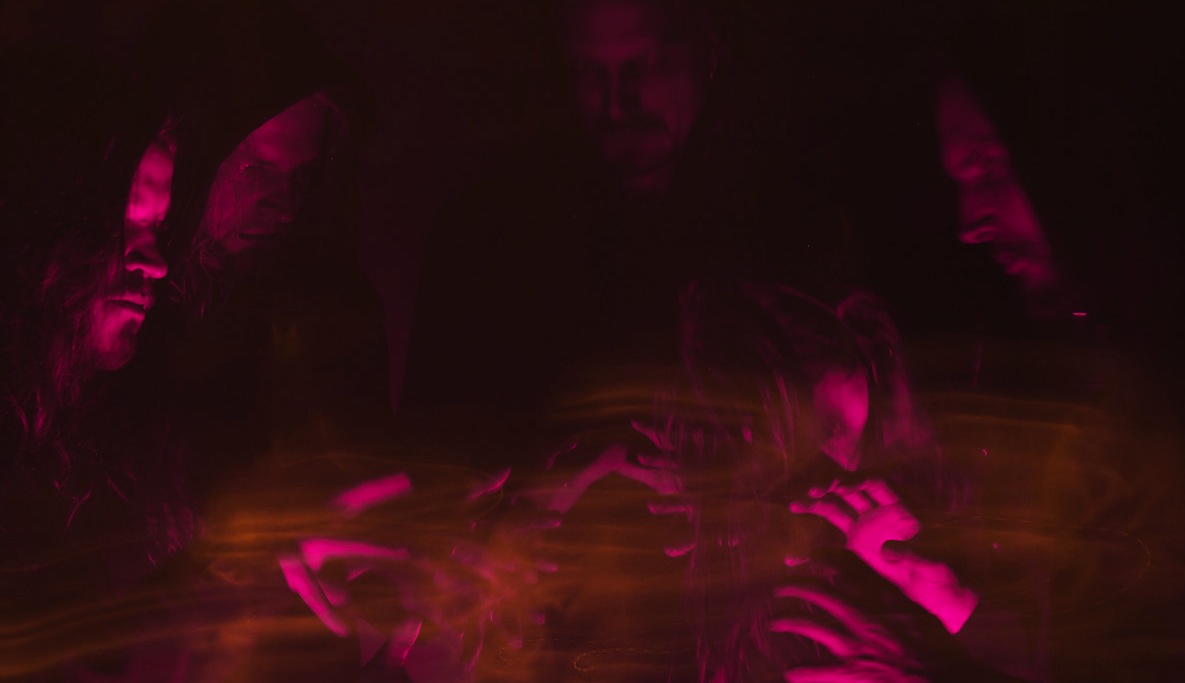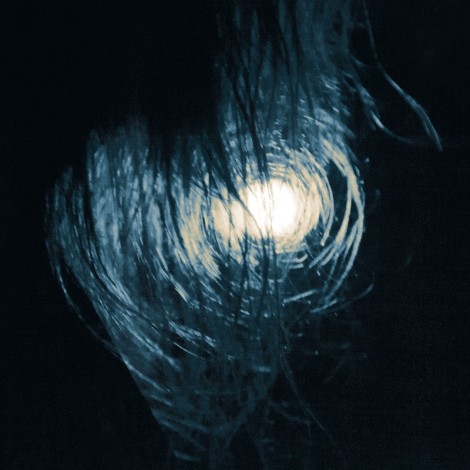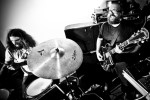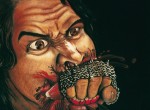Cosmic darkness: An interview with Oranssi Pazuzu

Oranssi Pazuzu’s Värähtelijä is a hard record to get one’s head around in just one listen. It’s a long album, spread out over two LPs and featuring five tracks around or longer than 10 minutes apiece. It’s also a remarkably diverse album, never dwelling in one space or style of music for very long before changing course or redrawing the roadmap. It’s also a tricky album title to say for those not familiar with the Finnish band’s native tongue, but no matter how one approaches the album, the experience will almost inevitably prove to be a disorienting one.
It’s that way by design. When Treble reached out to Oranssi Pazuzu bass player Ontto to discuss their new album, he explained via email about how the psychedelic metal band’s aims to make people “contemplate their madness” and losing one’s identity via alien symbiosis growing inside you. Indeed, their perspective on music is just as mind-bending as the colorful, sprawling sounds that occupy their latest album (and for that matter, its predecessor, Valonielu).
With Värähtelijä having just been released via 20 Buck Spin, the band gave us the details behind the making of the album, their intent to never repeat themselves, and uh, alien symbiosis.
Treble: Was there an overarching idea to the new album in mind when you began to write the songs?
Ontto: The initial idea was to continue on from where our previous album Valonielu left off, and to sink deeper into the cosmic darkness and hypnotic repetition. We have been using those elements before, but felt that there still was something more left to explore. Also we wanted the music to be very intuitive. We used a lot of time and space to build a strong atmosphere, so it became pretty long and unrestricted album.
T: Värähtelijä is almost twice as long as Valonielu. Was it your intent to create something bigger and more sprawling this time around?
O: I think on our last album we broke some personal musical barriers inside the band, and as we started jamming new stuff, it came out of us almost flooding, I mean we didn’t have to force things out, we just played and played, and there was always something new coming up. So we started recording these jams and ideas, and at some point we had so much material that it would have been just stupid to try fitting that on one album. We would have had to cut too much important stuff away, and I think it would probably have ruined the good flow we had. So we decided that we should rather just let it all come out and make it a more massive and also more free entity.

T: There’s also a pretty diverse sound throughout. To what degree were you challenging yourselves to expand the sonic elements of Oranssi Pazuzu? Were you stepping outside of your comfort zone?
O: We have always liked playing with different sounds, especially our effects wizard Evill and space guitar expert Moit are very open minded, and they endlessly figure out new tricks to add a touch of adventure to the mixture. In a way we like to think about the music as a sonic landscape. There is definitely some action happening, but also this epic scenery behind it, and those things are equally important to us.
T: For this album you worked with Julius Mauranen, who has worked with a lot of non-metal bands. What kinds of ideas did he bring to the album? Was it important to collaborate with a producer who specialized in a broad array of music?
O: One of the reasons we chose to work with Julius was that we wanted someone who could look at this from outside the regular heavy metal aesthetic. We have always tried to avoid sounding like a modern metal band, instead we like it more organic and foggy, and Juppu understood that. His job was to capture on tape the live feeling of us playing and make it sound as cosmic, intense and breathing as possible. He didn’t interfere with the songs per se, but instead he worked his ass off to get the sounds right.
T: How collaborative was the writing process on the record?
O: It was very collective. Like I mentioned, most of the core ideas for the songs just came out while we were jamming. Of course we had to revisit the songs many times and add things, mix parts together and so on. Well, the first song is based largely on my riffs, and the finale of the two last songs is based on Jun-His’ ideas mostly, but even in those there is great input from everyone in the band, and very jammy parts all over them. That’s exactly how we wanted the album to be, to let the whole band vomit their stuff on it.
T: An album this ambitious seems like it would be complicated to replicate live. Is that something that’s taken into consideration when writing?
O: No! I guess we are fucked soon, because the tour starts in three weeks! Well, it’s demanding, sure, but we played most of it live already in the studio, so I’m pretty confident that we will be able to do most of it live too. And if we won’t, at least there’s gonna be some rock ’n’ roll danger at the shows!
T: Värähtelijä, based on my research, translates to “oscillator.” What’s the origin of the album’s title, and how does it relate to the music?
O: Yeah, that’s a good translation. I would go with “resonator.” Some dude even called it “vibrator,” but I guess that was a bit freudian of him, haha! Well, actually we picked up the title from the song of the same name. In that particular song, the “resonator” refers to an organic alien symbiosis inside your guts, that is growing inside and changing you, and in the end you lose track of your identity. As the album title, it naturally refers to the resonance that the album induces between the listener and the cosmic horrors of the mind.
Treble: Black metal has always been a part of the band’s sound, but over time it’s less of an explicit element. What does it mean to you at this stage?
O: I think black metal used to be exciting and fearsome music. Maybe it can still be that today. But we’re not exactly a black metal band, and we’re not interested in just holding on to a tradition for the sake of it. We’d rather do our own thing, even if it sounds insane to some people. Our philosophy and way of doing things is our own. We will expand and develop it and learn new things about ourselves in the process.
T: What do you ultimately want listeners to take away from hearing Värähtelijä?
O: I hope it will take you to an altered state of mind and let you contemplate your madness and your fears through a cathartic experience. I promise this will not happen if you play it on an iPad while surfing the Internet. But if you make the listening experience a ritual for yourself, and you dive in with open mind, I think there are some interesting dimensions to explore.
You might also like:



Jeff Terich is the founder and editor of Treble. He's been writing about music for 20 years and has been published at American Songwriter, Bandcamp Daily, Reverb, Spin, Stereogum, uDiscoverMusic, VinylMePlease and some others that he's forgetting right now. He's still not tired of it.

